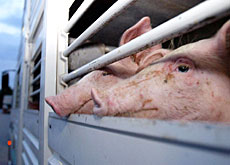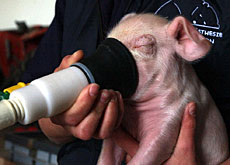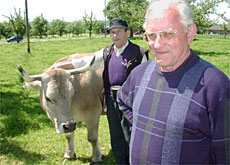Animal activists say law permits cruelty

Animal-rights supporters say Swiss legislation “seriously lags behind” other countries and allows cruelty that is banned elsewhere.
Swiss Animal Protection (SAP), the country’s largest animal-welfare group, claims there are major loopholes in the law governing the keeping of working animals, pets and wild animals.
At a news conference in Bern on Monday, SAP said government plans to revise the law on animals did not go far enough.
It has put forward a list of demands aimed at further tightening legislation.
The appeal comes just days before a parliamentary commission meets to discuss the revised animal-protection law.
Improvements prevented
SAP’s director Hansueli Huber said Switzerland had lost its pioneering role in animal protection because “the lobby of those who exploit animals” had blocked improvements that were ethically and scientifically based on animal protection.
“The legislation which has been in place since 1981 leaves the door open to a catalogue of bad treatment towards animals,” he commented.
Huber noted that there were no independent ombudsmen in the federal commission that specialises in animal protection, as was the case in neighbouring Austria.
He also pointed out that Austria and Sweden had banned the keeping of wild animals or their use in circuses.
In Italy, education in schools about animal protection was about to become compulsory, added Huber.
And in Norway, the use of tie-stalls for cows was due to be prohibited after a transition period.
Huber said this practice was to a large extent permitted in Switzerland, with the exception of 90 days a year that a cow may spend outside.
Tougher rules
The Senate, the parliamentary chamber that represents the cantons, voted in October for tougher rules governing the treatment of animals.
But it stopped short of imposing a ban on certain imports, demanded by animal-welfare activists.
It unanimously agreed to a series of measures, including a ban on the castration of pigs without anaesthetic. These went beyond proposals by the government to update the animal-protection law.
The Senate’s plans were seen as a counter-proposal to a people’s initiative launched in July last year by the SAP to force a nationwide vote on the issue.
The initiative, For a Modern Protection of Animals, aims to anchor animal rights legislation in the Swiss constitution.
swissinfo with agencies
Swiss Animal Protection (SAP) was founded in 1861.
There are branches of SAP in practically all Swiss cantons.
SAP is a member of the World Society for the Protection of Animals.
It is financed with contributions from patrons and donations. The organisation receives no state subsidies.
The current animal protection law dates from the year. It came into force on July 1, 1981.
It has been changed five times since then, the last occasion in June 2003.
Its main aim is to give improved information to the general public and better training to those who keep animals.
The Senate voted for tougher plans than the government on October 6. At the same time, it recommended rejection of SAP’s initiative.

In compliance with the JTI standards
More: SWI swissinfo.ch certified by the Journalism Trust Initiative



You can find an overview of ongoing debates with our journalists here. Please join us!
If you want to start a conversation about a topic raised in this article or want to report factual errors, email us at english@swissinfo.ch.